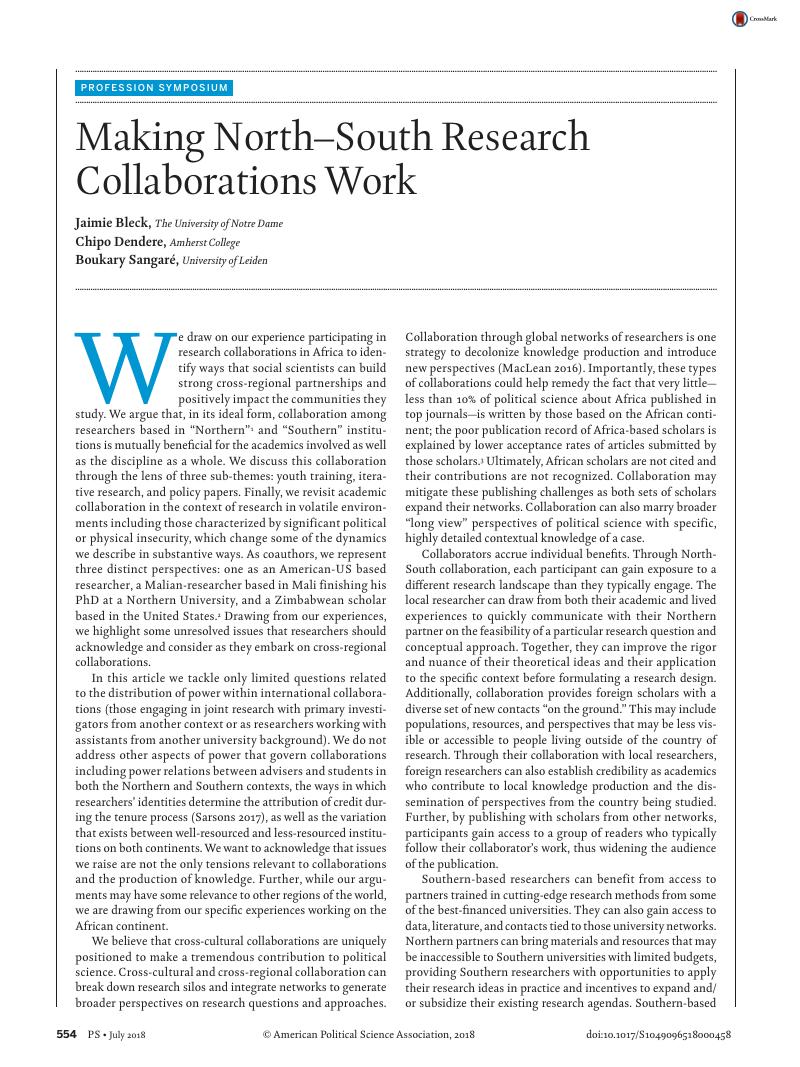Crossref Citations
This article has been cited by the following publications. This list is generated based on data provided by Crossref.
Kontinen, Tiina
and
Nguyahambi, Ajali M.
2020.
Institutional Learning in North–South Partnerships: Critical Self-Reflection on Collaboration Between Finnish and Tanzanian Academics.
Forum for Development Studies,
Vol. 47,
Issue. 2,
p.
219.
Kelly, Jill E.
and
Badsha, Omar
2020.
Teaching South African History in the Digital Age: Collaboration, Pedagogy, and Popularizing History.
History in Africa,
Vol. 47,
Issue. ,
p.
297.
Thaler, Kai M.
2021.
Reflexivity and Temporality in Researching Violent Settings: Problems with the Replicability and Transparency Regime.
Geopolitics,
Vol. 26,
Issue. 1,
p.
18.
Vieira, Elizabeth S.
2022.
International research collaboration in Africa: a bibliometric and thematic analysis.
Scientometrics,
Vol. 127,
Issue. 5,
p.
2747.
Johnson, Arlyne
Saypanya, Santi
Hansel, Troy
and
Rao, Madhu
2022.
More than an academic exercise: Structuring international partnerships to build research and professional capacity for conservation impact.
Conservation Science and Practice,
Vol. 4,
Issue. 5,
Kotze, Shelley
and
Dymitrow, Mirek
2022.
North–South research collaborations: An empirical evaluation against principles of transboundary research.
Development Policy Review,
Vol. 40,
Issue. 2,
Cerdeira, Jorge
Mesquita, João
and
Vieira, Elizabeth S.
2023.
International research collaboration: is Africa different? A cross-country panel data analysis.
Scientometrics,
Vol. 128,
Issue. 4,
p.
2145.
Mahmood, Muhammad N.
and
Dhakal, Subas P.
2023.
Ageing population and society: a scientometric analysis.
Quality & Quantity,
Vol. 57,
Issue. 4,
p.
3133.
Thaler, Kai M.
Juelich, Antonia H.
and
Ashley, Sean Paul
2024.
From snapshots to panoramas: navigating power, space, and time in the study of armed groups.
Conflict, Security & Development,
Vol. 24,
Issue. 6,
p.
725.
Ibrahim, Sulley
Kuppens, Line
and
Nfundiko, Justin Sheria
2024.
Holding up the researcher’s mirror to decolonize knowledge generation: a critical examination of researchers’ positionality beyond the ‘Global North’/‘South’ divide.
Globalisation, Societies and Education,
Vol. 22,
Issue. 3,
p.
461.
Sooryamoorthy, R.
2024.
African Societies.
p.
239.
Tokdemir, Efe
Kalın, İlker
Cunningham, Kathleen Gallagher
Aksoy, Deniz
Carter, David B.
Loyle, Cyanne E.
Akcinaroglu, Seden
and
Gleditsch, Kristian Skrede
2024.
Forum: Fostering Cooperation in Conflict Research Beyond Borders.
All Azimuth: A Journal of Foreign Policy and Peace,
p.
1.
Mitra, Ankushi
McNew-Birren, Jill
and
Nickels, Ashley E.
2024.
Who counts in civically engaged research? Rethinking expertise and authority in politics.
Politics, Groups, and Identities,
p.
1.
Sooryamoorthy, R.
2024.
African Societies.
p.
73.
Dhakal, Subas P.
and
Mahmood, Muhammad N.
2025.
A scientometric analysis of three decades of research on workplace psychosocial hazards: Implications for policy and practice.
Journal of Safety Research,
Vol. 93,
Issue. ,
p.
79.



